
' s I
I I
I t
\ iiF 'r '
ii II
why the Fuegians are always so dispersed among the islands
in small family parties, why they never remain long in one
place, and why a large number are not seen many days in
society. T h ey never attempt to make use of the soil hy any
kin d of c u ltu re ; seals, birds, fish, and particularly shell-fish,
being their principal subsistence; any one place, therefore, soon
ceases to supply the wants of even one family ; hence they are
always migratory.
In a few places, where the meeting of tides causes a constant
supply of fish, especially porpoises, and where the land is
broken into multitudes of irregular islets and rocks, whose
shores afford an almost inexhaustible quantity of shell-fish, a
few families may be found a t one time, numbering altogether
among them from twenty to forty souls; b u t even those
approaches towards association are rare, and those very families
are so migratory by nature, th a t they do not remain many
months in such a spot, however productive it may be, b u t go
wandering away among the numerous secluded inlets or sounds
o f their country, or repair to the outer sea-coast in search
o f seals, a dead whale, or fragments of some wrecked ship.
D u rin g the summer they prefer the coast, as they then obtain
a great qu an tity of eggs and young birds, besides seal, which
come ashore to breed a t th a t season ; and in the winter they
retire more into the interior waters in search o f shell-fish, and
the small b u t numerous and excellent fish which they catch
among the sea-weed (kelp).
T h e substitutes for clothing, the arms, canoes, and dwellings
of the Fuegians have been so often described already,
th a t I will not tire the reader by a repetition. Some of their
customs, hitherto not related, may be more interesting.
There is no superiority of one over another, among the
Fuegians, except th a t acquired gradually by age, sagacity,
and daring co n d u c t; b u t the ‘ doctor-wizard’ of each p a rty has
much influence over his companions. Being one of the most cunning,
as well as the most deceitful of his tribe, it was not surprising
that we should always have found the ‘ doctor’ concerned
in all mischief and every trouble arising out of our intercourse
with these natives. I t became a saying among us, th a t such
a person was as troublesome as a Fuegian doctor.
In each family the word of an old man is accepted as law
by the young people; they never dispute his authority. W a rfare,
though nearly continual, is so desultory, and on so small
a scale among them, th a t the restraint and direction of their
elders, advised as they are b y the doctors, is sufficient.
Ideas of a spiritual existence—o f beneficent and evil powers
—they certainly h a v e ; b u t I never witnessed or heard o f any act
o f a decidedly religious nature, neither could I satisfy myself
of their having any idea of the immortality of th e soul. T h e
fact of their believing th a t the evil spirit torments them in this
world, if they do wrong, hy storms, hail, snow, &c., is one reason
why I am inclined to think th a t they have no th o u g h t o f a
future retribution. T h e only act I have heard of which could
be supposed devotional, is the following. W h en Matthews
was left alone with them for several days, he sometimes heard
a great howling, or lamentation, about sun-rise in the morning
; and upon asking Jemmy B u tto n what occasioned this
outcry, he could obtain no satisfactory answer; the hoy only
saying, “ people very sad, cry very much.” Upon one occasion,
when some canoes were alongside the Beagle, a t a
subsequent visit to the Beagle Channel (in 1834), a sudden
howl from one o f the Fuegians aroused several others who
were near, and a t the opposite side o f the vessel, when a general
howl of lamentation took place, which was ended by a
low growling noise. By this, as well as hy p u llin g their hair,
and beating their breasts, while tears streamed down their
faces, they evinced their sorrow for the fate of some friends who
had perished, some days before the Beagle’s arrival, by the
upsetting of a loaded canoe.* There was no regular weeping,
nor any thing a t all like the downright cry of a civilized b e in g ;
it was a noise which seemed to be peculiar to a savage. Th is
howling was mostly among the men, only one young woman
was similarly affected. Now whether the noises heard by
* The bottom of a Fuegian canoe is full of mud, or clay, for the fireplace.
2
i !